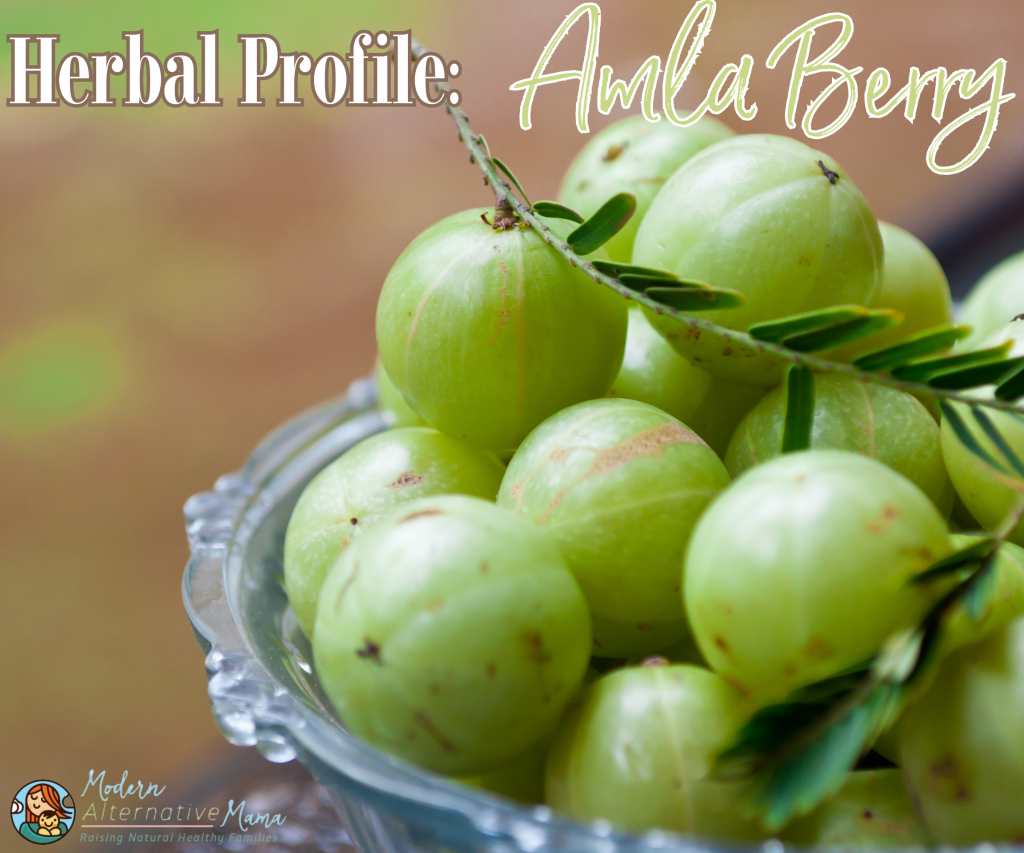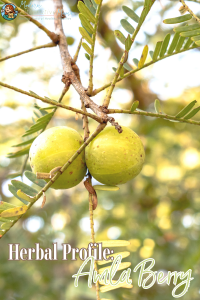What is Amla Berry
Amla berry, sometimes called amla, Indian gooseberry, or its scientific name Phyllanthus emblica, is a part of the Euphorbiaceae (spurge) family. Amla berries grow on 60-foot trees with grayish-green bark that peels off in flakes. The amla tree’s leaves come in pairs opposite of each other and are light green. Amla trees bear greenish-yellow flowers that bloom into berries that start green but turn yellow or red when ripe (1).
Health Benefits of Amla Berry
Amla berries are most commonly used for food but have been used in herbal traditions such as Ayurveda, Traditional Chinese Medicine (TCM), and folk medicine due to their many health benefits, including:
Rich in Nutrients
The human body needs nutrients to flourish. Without vital vitamins and minerals, the human body won’t function properly. Amla berry contains several B vitamins and vitamins A, C, and E (2). In fact, amla berry is one of the richest sources of vitamin C, doubling orange peel and camu camu and 7-8x higher than acerola, with 600 to 700 mg of vitamin C per amla fruit (3).
Antioxidant Properties
Antioxidants can help fight damage from harmful free radicals. The buildup of free radicals has been linked to chronic diseases, such as cancer and heart disease (4). Amla berry has antioxidant properties that stem from its gallic acid, ascorbic acid, and phenolic compounds (5,6). In animal studies, amla berry extract provided protection against arsenic-induced oxidative stress and cell damage in mice (7). Another study found amla berry to have the strongest antioxidant activity and highest total polyphenol and tannin content of 30 plant extracts tested (8).
Anti-Inflammatory Properties
Although inflammation is a natural bodily response, chronic inflammation can lead to detrimental health effects. Chronic inflammation has been linked with many diseases, such as type 2 diabetes, asthma, and certain cancers (9). Thankfully, amla berries possess robust anti-inflammatory properties (10,11). One study concluded amla berry extract has a better and safer anti-inflammatory profile than nonsteroidal anti-inflammatory drugs NSAIDs (12).
May Support the Immune System
The immune system protects the body from outside invaders, including bacteria, viruses, fungi, and toxins (13). When you support your immune system, you potentially support your body’s ability to fight sickness. The vitamin C content in amla berries promotes and enhances immune cell function (14). In animal and human studies, vitamin C helped prevent certain infections and, like elderberries, has shortened the duration of common colds (15).
May Promote Heart Health
Unfortunately, heart disease is the world’s number one cause of death (16). Due to the incredibly complex determinants of heart disease and various possible contributions, it’s hard to pinpoint an exact way to prevent it. Still, you can at least take steps to lower your overall risk. That’s where amla berries may come in.
Several studies have demonstrated amla berry’s ability to decrease blood pressure levels (17,18,19). One study found consuming amla extract resulted in a 39% decrease in the patient’s atherogenic index of plasma (AIP), a cardiometabolic health risk assessment (20,21). Another study discovered 500 mg of amla extract reduced triglyceride, total cholesterol, and LDL cholesterol levels when taken twice daily for 12 weeks in patients with abnormal blood lipid levels (22). A final study revealed that 12 weeks of amla extract supplementation improved risk factors for heart disease, like decreased cholesterol and blood glucose levels in overweight and obese participants (23).
May Support Kidney Health
The kidneys are most known for their responsibility to remove waste products and excess fluid from the body through urination to maintain a stable balance of its natural chemicals. This function is needed due to the importance of regulating the body’s salt, potassium, and acid content, all performed by the two kidneys (24). For some people, low urinary citrate is a risk factor for developing kidney stones (25).
One study demonstrated amla berry’s ability to normalize kidney function in rats with induced kidney toxicity (26). Another study discovered amla extract preserved kidney function and protected against kidney damage (27). A final study found amla extract reduced oxidative stress, helping prevent age-related kidney dysfunction (28).
May Promote Liver Health
The liver is the largest internal organ, responsible for over 500 vital functions like bile production, detoxification, production and regulation of vital bodily processes, and more (29).
In animal studies, rats fed a high fructose diet experienced increased protein expression of the liver, preventing fructose-induced fatty liver disease when amla berry was added to their diet (30). In another animal study, rats fed a high-fat diet experienced improvements in fatty liver disease, reduced belly fat and body weight with amla berry consumption (31).
May Support Healthy Digestion
The digestion process breaks down food into smaller components that can be absorbed into the bloodstream and turned into nutrition (32). When food isn’t digested properly, digestive troubles like heartburn may occur. In animal studies, amla berries demonstrated antidiarrheal and antispasmolytic properties that can help manage digestive troubles (33). In human studies, 500 mg of amla extract taken twice daily significantly reduced the severity and frequency of heartburn and regurgitation in gastroesophageal reflux disease (GERD) patients (34).
May Help Manage Stomach Ulcers
Stomach ulcers are open sores that develop on the stomach lining or upper portion of the small intestine due to Helicobacter pylori (H. pylori) or long-term use of nonsteroidal anti-inflammatory drugs (35). Thankfully, animal studies indicate amla berry extract has gastroprotective properties that can help manage stomach ulcers (36,37). One study noted amla berry’s biphasic effect that promoted gastric ulcer healing in nonsteroidal anti-inflammatory drug (NSAID)-induced gastropathy (38).
May Promote Hair Growth
Promoting hair growth has been a hot topic, especially with telogen effluvium (TE) impacting many people post-covid infection and vaccination (39,40). Thankfully, amla berries may help. In vivo, amla berry extract demonstrated the ability to promote the proliferation of human hair follicles (41). In animal studies, amla berry extract inhibited 5α-reductase, an enzyme impacting hair loss, increasing the hair follicle count in rats (42). In a 90-day human study, an amla-containing hair serum significantly improved hair growth and density in participants struggling with hair loss (43).
Anticancer Properties
Statistics say that 158.3 of every 100,000 individuals will die from cancer, but what if they didn’t have to (44)? Studies have noted amla berry’s radiomodulatory, chemomodulatory, and chemopreventive effects, which are influential when fighting and preventing cancer (45). In vivo and in vitro amla extract has demonstrated potent tumor-repressive properties against numerous cancer types, including cervical, ovarian, colon, prostate, lung, gastric, and breast cancer cells (46).
Safety Concerns
According to the mainstream, amla berry is commonly consumed in food. They say it is possibly safe when used as medicine at doses of up to 1,000 mg daily for up to 6 months, 1,500 mg daily for up to 2 months, and 2,000 mg daily for up to 1 month. It is unclear if these doses are safe to take for longer periods. They claim there isn’t enough reliable information to know if amla berry is safe or what the side effects might be when applied topically while pregnant or breastfeeding. Additionally, they warn amla berry might increase the risk of bleeding or bruising in some people, like those with a bleeding disorder or undergoing surgery (47).
According to the Modern Alternative Mama and Earthley’s lead herbalist, Kate Tietje, amla berry, like many berries that are used as both food and medicine (including blueberries, elderberries, and more), are safe for daily use in moderate and high doses for all ages in most situations.
I scoured many scientific databases and could not find evidence of amla berry causing issues while pregnant or breastfeeding. I also found no evidence of increased risk with long-term use or topical application. With that said, if there is no evidence that it has caused harm, and everything claimed is speculation, I am confident it is safe to use. As always, trust your instincts. Every person feels different because every person is different; if your gut is telling you to pass on amla berry, it’s best to do so.
How to Use Amla Berry
You can find amla berries in dried bulk, pills, powders, teas, extracts, or tinctures. Tinctures always contain the most concentrated amount of herbs. Teas and soups are also options, especially when following Ayurvedic medicine recipes. If you’re a DIY person, some great starter recipes are:
- Immunity Tincture
- How to Make a Water Extraction (With Almost Any Herb) – to make an amla berry tea or decoction
- How to Make a Glycerin Extraction (With Almost Any Herb) – to make an amla berry tincture
Follow the recommendations of any supplement; some of my recommendations include:
- Earthley’s Adaptogenic Immunity combines five certified organic herbs that can support the immune system, improve the body’s ability to cope with stress, and nourish you for total body wellness! This alcohol-free, botanical liquid is highly bioavailable and easy to assimilate. These herbs are generally safe even for people who have been told not to use “immune boosters.”
- Earthley’s Blueberry-Hemp Moisturizer relieves skin inflammation and stimulates pro-collagen production. Heal damaged skin, improve signs of premature aging, and naturally cool the face with nature’s power.
- Earthley’s Hair Butter will leave your curls moisturized and voluminous. Prepare for the most humid and rainy days with a hair butter that will leave your hair frizz-free.
- Earthley’s Healthy Heart is an herbal supplement that supports the heart and a proper immune response. This tincture is rich in anti-inflammatory properties and vitamin C. It can help lower blood sugar and blood pressure, increase insulin activity, and even help with symptoms of type 2 diabetes.
- Earthley’s Thyroid Support is an herbal formula for thyroid support and total body wellness. The herbs include ashwagandha, amla berry, licorice root, Brahmi leaf, and milk thistle seed. It also supports a healthy liver and stress response and is rich in vitamin C.
- Earthley’s Vita-C Tincture is a whole food form of vitamin C extracted from amla berries, orange peel, and dandelion leaves. This bioavailable herbal liquid remedy is minimally processed and easy to use. Vitamin C is a powerful antioxidant. In its whole plant form (not an isolate), it’s unstoppable!







